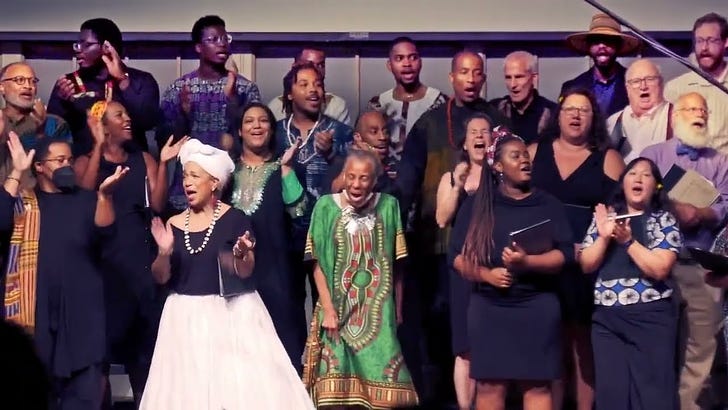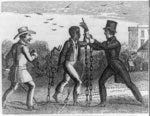Thank you to all of my subscribers and a warm welcome to new visitors!
This week’s Sunday Special commentary is about slave songs in the U.S. throughout the 1800s. I’m not going to focus on one particular song, but I’ll include a couple of videos at the end as examples of the kinds of songs referred to in the article.
✳️ Note: The level of this article is for students with a TOEIC of 550+, Eiken Pre-1, CEFR B2. For Japanese students, vocabulary words in bold are provided in Japanese below.
(807 words)
In many people’s minds, the slaves on the southern plantations in the United States were quiet workers who obeyed their masters. What most people don’t know, however, is that from the time that slaves were first brought into the United States in 1526 through the Civil War (1861-1865), there were hundreds of planned revolts. In the 1800s, at least 100,000 slaves escaped to Canada and other countries.
By the 1800s, slaves were being converted to Christianity. Many had come from countries that followed Islam. They were taught songs that reflected the Christian religion. Slaves used these songs to show their resistance to their human slavery.
Slaves were allowed to sing these songs by some masters, but other masters were afraid the songs could encourage slaves to revolt. Some slaves were punished or killed for singing. Those who were able to sing had to be careful. They would sing lyrics that did not openly disobey their masters or the society in which they lived. These songs have been handed down to us as African American spirituals such as I Shall not be Moved, Nobody Knows The Trouble I’ve Seen, and Go Down, Moses.
The lyrics often contained code words that the slaves understood but their masters did not. Songs such as Wade in the Water warned slaves to go into rivers or swamps in order to avoid dogs that were hunting them down. People often think that the song Follow the Drinking Gourd meant follow the North Star when escaping to Canada and that it was a song from before the Civil War. There is evidence that the song’s lyrics are actually from the 1930s (see Bresler), but it makes for a good story.
Nat Turner was a slave who led a group to revolt in Virginia in 1831. The military was called in to stop the resistance. Turner was eventually captured and killed, but a story spread about his facing southern slave owners. Nat Turner became a legendary hero. One set of lyrics includes a double meaning in the last line:
You mought (might) be rich as cream
And drive your coach and four horse team (a carriage with four horses)
But you can’t keep da world from moverin’ round (moving around)
And not turn her [Nat Turner] from the gaining ground
(Callahan 2022, p. 15)
A slave who sang There’s a better day coming could be asking for trouble. At the beginning of the Civil War, slaves in Georgetown, South Carolina, were jailed for singing We’ll soon be free. (Callahan 2022, p. 62). The song Children, We All Shall be Free contains the lyric We all shall be free when the Lord shall appear. According to Callahan’s research, “the Lord” in the songs at this time meant the Union Army which was bringing the hope of freedom to these Americans living in slavery.
Songs that people sang were not only coded lyrics used to get around their masters. There were songs that were clear in their call for slaves to fight for their freedom (found in Callahan, p. 26):
…Raise your arms and bare your breasts
Almighty God will do the rest
Blow the clarion’s warlike blast
Call every Negro from his task
Wrest the scourge from Buckra’s hand
And drive each tyrant from the land.
(In other words, the song is telling the slaves to blow the horn to call everyone together, to take up weapons to defeat their masters and send them far away.)
The song challenges the slaves to take action against a cruel and unfair system.
Anti-slavery songs
Mat Callahan writes in his book that, without the slaves’ fighting back, there would have been no abolitionist movement, and without that movement, there would have been no Civil War. Thousands of freed or escaped slaves served in the Union army and thousands more in support roles. If it had not been for them, the slaves might not have won their freedom.
There are many songs from the abolitionist movement of the 1800s that drew on popular American songs of the time. The lyrics were changed and put to traditional songs such as My Country, ’Tis of Thee (God Save the Queen), Massa’s in the Cold, Cold Ground, and even the Marseillaise. Darling Nellie Gray is also an abolitionist song.
Amazing Grace was written in 1772 by John Newton, a former captain of a British slave trading ship. Newton came to the realization that what he had been doing was cruel and unjust. He became a supporter of the abolitionist cause. William Wilberforce was the leader of the abolitionist movement in Britain. With Newton’s support, Wilberforce managed to pass a law to end the British slave trade. Callahan writes that even today, many people know Amazing Grace to be a song sung in church, but few remember its origins as an anti-slavery song.
VOCABULARY
obey 従う
plantation 植え込み
revolt 叛乱
insurrection 暴動
convert 改宗する
resistance 抵抗
disobey 叛く
swamp 湿地
inhumane 非人道的
abolitionist 奴隷制度廃止を賛成する人
Photo above:
On caption card: Diptych showing Negro passing from slave to free state; Rare Books Division. Print in Mrs. A.M. French's, Slavery in South Carolina and the ex-slaves, or the Port Royal Mission, 1862. Library of Congress: https://www.loc.gov/item/cph15333/
Notes
There is a 2006 film Amazing Grace, produced by Walden Media, that presents the story in its entirety.
The film Free State of Jones is about a soldier in the Confederate army who deserts and, with other deserters, escaped slaves, and women, starts his own country within Mississippi.
Sources
Amazing Grace: The Story Behind the Song. Documentary online at https://www.youtube.com/watch?v=8m8AHHduTM0 (14:29)
Bresler, Joel. Follow the Drinking Gourd. Website. http://www.followthedrinkinggourd.org/Afterword.htm. Accessed 24 Mar 2023.
Callahan, Mat. Songs of Slavery and Emancipation. University Press of Mississippi, Jackson. 2022.
Songs of Slavery and Emancipation - Documentary Film. (Art in History and Politics 2022) https://www.youtube.com/watch?v=HmytdAYr-s0
Rodney, Walter. How Europe Underdeveloped Africa. Verso Books, 2018.
Nat Turner
Children, We All Shall Be Free







Thanks, Louise! I knew the general theme—that music was a form of resistance—but a number of details were new. Singing is such a powerful tool and joy.
Interesting also, that according to the short video, Newton wrote "Amazing Grace" for the working people, and as a reaction to his near death at sea. It later became associated with his anti-slavery beliefs. It looks like a full movie is available on YouTube. I'll check it out next.